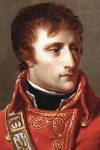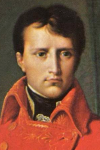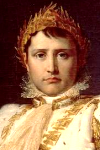Immediately after his arrival in Paris, Napoleon began preparations for the coup conceived by Emmanuel-Joseph Sieyes and held on November 9th (18 Brumaire). Harder than initially expected, it left Bonaparte in control. Named First consul (the other two were Sieyes and Roger-Ducos), he rejected the draft constitution prepared by Sieyes and passed another one that was endowing him with all powers (December 15th). On the 24th, he was strong enough to remove Sieyes from office and to replace him with Jean-Jacques Regis de Cambaceres (while Charles-François Lebrun took the place of Roger-Ducos).
During those first weeks in power, Napoleon Bonaparte took a series of measures to strengthen the system by closing the deepest wounds opened by the Revolution: repeal of the law to take hostages among the parents of emigrants and former nobles, cancellation of the deportation of some categories of priests, signature of an armistice with the Vendee, and so on.
Napoleon Bonaparte continued during the first months of 1800 to establish new institutions: limiting the number of Paris newspapers, creation of the Banque de France, organization (kept as a secret) of a reserve army of 60,000 men under his direct command, new law on administrative organization of France (in particular, creating the prefects), and a new law on court organization. Meanwhile, these soothing measures, strengthened even further earlier that year with the closure of the list of emigrants, had the effect he desired, leading to the submission of Vendee and many royalist leaders, including Georges Cadoudal (February 14th).
On February 7th, 1800, a referendum was held to ratify the constitution. The results, published on the 18th, showed 3,011,007 votes for and 1562 against.
However, as France was still at war with Europe, Bonaparte left Paris on May 6th to rejoin the army, setting the beginning of the second Italian Campaign. He crossed the Alps by the pass of St. Bernard, then northern Italy and entered Milan less than two weeks later, on June 2nd. On the 14th, the victory of Marengo ended the campaign. Soon the French were in Turin and Genoa.
Back in Paris on July 2nd, Napoleon devoted himself to the Government
of the country. He established a commission to develop the civil
code on August 12th, a Ministry of Treasury on September 27th
by resolution of the Ministry of Finance. He also developed an
intense diplomatic activity, with a series of treaties signed
with Spain on October 1st (Treaty of San Ildefonso), with the
United States of America on the 3rd (Mortefontaine
Treaty
Feeling strengthened in power, Bonaparte could finally answer,
on September 7th, the Count
of Provence, who had written on February 20th: We can
ensure the glory of France. I say we, because I would need Bonaparte
to that end, and he could not do without me
. He did so
by sending a brutal stonewalling: You should refrain from
even considering your return to France, as you would walk over
a hundred thousand corpses
.
The year 1800 ended for the First Consul, however, in a contrasting fashion. Jean-Victor Moreau crushed the Austrians at Hohenlinden on December 3rd, and a league of neutral countries (in fact directed against England) was formed on the 16th, bringing together Russia, Sweden, Denmark, and Prussia. But such good news were ruined by the attack Napoleon suffered on the 24th on rue St. Nicaise, which killed 22 people and injured 56. Napoleon himself came out without a scratch. Before the real instigators (the Royalists) were unmasked, this attack was attributed to the Jacobins, and was used by Napoleon as an excuse to make justice more expeditious for a variety of crimes.
Such concerns did not stop Napoleon's diplomatic efforts to end the wars of the Revolution: On February 9th, 1801, the peace between France and Austria was signed at Luneville; on the 27th, he wrote to Tsar Paul I, advance resulting in the opening of negotiations with Russia on March 6th; on the 18th, the peace negotiations with the Kingdom of Naples ended; the 21st, the Treaty of Aranjuez was concluded with Spain. Only the English continued hostilities, sending troops to Egypt. However, the resignation of Prime Minister William Pitt "the Younger", on March 14th, may offer also hope of a shift in British policy. Napoleon considered himself in any case strong enough to bring to France the left bank of the Rhine (March 8th) and the Duchy of Parma (March 21st).
The major concern of Napoleon Bonaparte, in the following months, was the negotiation of the Concordat. He appointed his brother Joseph to negotiate with the plenipotentiary envoy of the Pope, Cardinal Secretary of State Consalvi. The case was carried out efficiently and the Concordat was signed on July 15th, 1801, before being ratified on September 8th by the First Consul.
Domestically, Napoleon continued his work of administrative reconstruction with the establishment, on March 28th, of the commission responsible for drafting the criminal code, the beginning of the discussion of the civil code by the State Council on July 23rd, the organization of the National Gendarmerie on the 31st, the establishment of commissions responsible for drafting the commercial code (August 3rd) and the rural code (August 10th), the establishment of the inspectors general of the Treasury on September 6th, the creation of a Director General and four Directors of Customs on the 16th, the creation of a Minister of the Treasury on the 27th.
In autumn 1801, new peace treaties were signed: with Portugal on September 29th, with Russia on October 8th. More importantly, discussions began with England after the end of hostilities in Egypt, where the remains of the French expeditionary force were forced to surrender in Cairo on June 27th, the rest of the country on July 31st. The first exchange of views led on October 1st to the signing of peace preliminaries. The opening of serious negotiations at Amiens on December 3rd followed. The year 1801 ended for Napoleon with the departure of the expedition of Saint-Domingue (Hispaniola) under the command of his brother-in-law General Victor Emmanuel Leclerc (December 14th). Leclerc's mission was to recover the island, run by Toussaint Louverture; he landed on February 6th, 1802.
In Europe, Napoleon was elected President of the Italian Republic (January 25th, 1802), and was about to sign with England the Treaty of Amiens (March 25th), which allowed France to find peace for the first time since April 20th, 1792. This peace, however, was made fragile by a provocative foreign policy. On September 11th, the Piedmont was held in France. On the 30th, the First Consul imposed his mediation to the Swiss cantons in the conflict between federalism and union proponents and appointed, on October 17th, Michel Ney as commander of the French forces in Switzerland in order to restore calm, if necessary by force. On the 20th, a note from Charles-Maurice de Talleyrand-Périgord threatened England with another war if Malta was not evacuated.
Domestically, Bonaparte, who was on a seemingly never-ending successful
run, continued his march towards monarchy. On May 6th, 1802, the
Tribunat proposed to give General Bonaparte, First Consul,
a striking pledge of national recognition
. On the 8th,
a senator proposed to name him consul for life but the Senate
simply declared him reelected for ten years immediately
following the ten years for which he was appointed.
On
the 9th, Bonaparte claimed that the popular vote will confirm
that decision. On the 10th, he announced an order for a plebiscite
in which the question had become: Should Napoleon be Consul
for life?
. The answer was clearly positive and the Senate
was forced, on August 2nd, to proclaim the result before making
on the 4th the necessary amendments to the Constitution. In the
months that followed, the First Consul began to receive almost
royal honors while the regime was strengthening its control over
theaters and newspapers. Meanwhile, the Church and the Judiciary
found forms and prerogatives lost with the Revolution.
Napoleon was also continuing his policy of reform. On March 24,
1802, he established a committee to draft the code of civil procedure;
on April 26, a broad amnesty was given to recent emigrants; on
May 1st, a law established the regime of Education. On the 19th,
a bill establishing the Legion of Honor was voted. On November
19th, the Directorate General of Museums was created and Dominique
Vivant Denon became Directorate General of the
Louvre
In the Caribbean, Toussaint Louverture was arrested on June 7th,
1802, just over two weeks after the passing of a law restoring
the slave trade and slavery in accordance with laws and
regulations prior to 1789
(May 20th). This new policy
resulted in a general uprising of slaves on September 13th. General
Leclerc died of disease on November 2nd, 1802 while the expedition
was slowly turning into a fiasco.
Throughout the year 1803, Bonaparte took further steps to strengthen his authority, rewarding the faithful (thirty-one senators were appointed on January 4th as senators for life), weakening rival powers (in December, the Legislature lost the right to appoint president) and muzzling the opposition (the Academy of Moral and Political Sciences, colonized by the "ideologues" of moderate Republicans, was eliminated). Gradually, a symbolic monarchy was taking form. From March 28, 1803, new currencies bore he First Consul's figure. Only his brothers, Lucien as well as Jérôme, whose marriages that year were disapproved by Napoleon, seemed able to defy his will.
However, he pursued the reform and administrative reorganization even further: regulation of the practice of medicine, creation of schools of pharmacy, organization of notaries; passing of a law regulating the operation of factories and workshops (which prohibited coalitions of workers and established brand protection); in April 1803, he established a currency reform that would become the "Franc germinal" with the Bank of France as preferred issuing institution; in September, the extraordinary work of roads and bridges, digging and repair of canals, drainage of the marshes, received substantial endowments, and the workman's book was established on December 1st.
Napoleon did not fail to cherish the Church and the clergy, both from a practical point of view - their privileges became unassailable and those of the high-clergy were reinforced; seminarians were exempt from conscription, and a symbolic measure: only the of names of saints and characters of the past became accepted as given names in the civil register.
At first, his foreign policy mimicked that of the previous year: Switzerland received its new Constitution of the hands of the First Consul (Mediation Act of February 19) and concluded a treaty of alliance with France; on March 24th, the Diet of Regensburg changed thoroughly the political balance of Germany under the Treaty of Luneville. Especially during the months of February and March 1803, the situation continued to tighten with England about Malta. The break occured in May: On the 11th, France rejected an English ultimatum and the Treaty of Amiens was terminated the following day; On the 17th, the British government decreed an embargo on French ships and seized more than 1,200 vessels and 200 million of goods; on the 22nd, the Englishmen in French territory were arrested and on the 23rd a war with England was declared. The first hostilities erupted in Hanover, which the First Consul invaded through Adolphe Edouard Casimir Joseph Mortier on the 27th, and surrendered on July 4th. The inexorable march to the resumption of conflict between France and the United Kingdom was one of the powerful reasons why the First Consul sold Louisiana to the United States of America (Louisiana Purchase, April 30).
Simultaneously, preparations for war with England were going well: in June 1803 Napoleon organized a large Army of England, for which a company of guides and interpreters was created on October 1st; he presented a plan of invasion in July, receiving an early application in the fall: the First Consul himself wrote an instruction for the crews of the landing crafts. On November 3 and again on December 30, he visited Boulogne for inspection. For its part the United Kingdom did not remain inert, organizing a clandestine landing on August 21st, 1803, with Georges Cadoudal and other Chouans at the Biville cliff, in Normandy.
The year 1803 closed for Napoleon on bad news again from the West Indies: On November 28, Donatien-Marie-Joseph de Rochambeau and the remains of the expedition to Saint-Domingue had to capitulate.
For Napoleon, the main event of the beginning of 1804 was a conspiracy, organized with the help of England, intended to assassinate him. It all began on January 16th with the clandestine landing of royalist agents, including Jean-Charles Pichegru, which came into contact with Georges Cadoudal and General Jean-Victor Moreau. The First Consul was quickly informed of the conspiracy and reacted by immediately arresting Moreau (February 15th). The other conspirators soon joined him in prison: Pichegru on February 27th and Cadoudal on March 9th. Their trial opened on May 25th without Pichegru, found strangled in his cell on April 6th. On June 10th, Cadoudal was sentenced to death (sentence executed on the 25th), while Moreau was sentenced to two years imprisonment, soon commuted to exile.
Meanwhile, the statements made by Cadoudal during interrogation
were misinterpreted and led to the abduction on foreign soil of
the Duke
d'Enghien, for his expeditious judgment by a military commission and execution at
Vincennes




